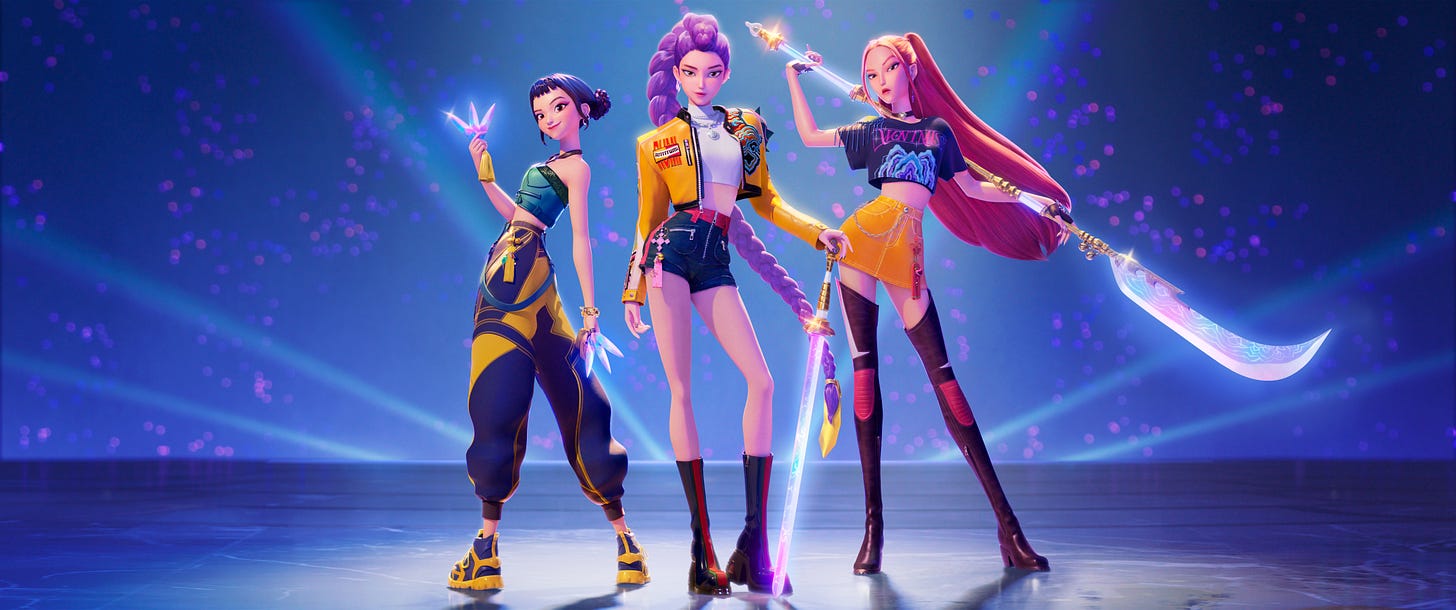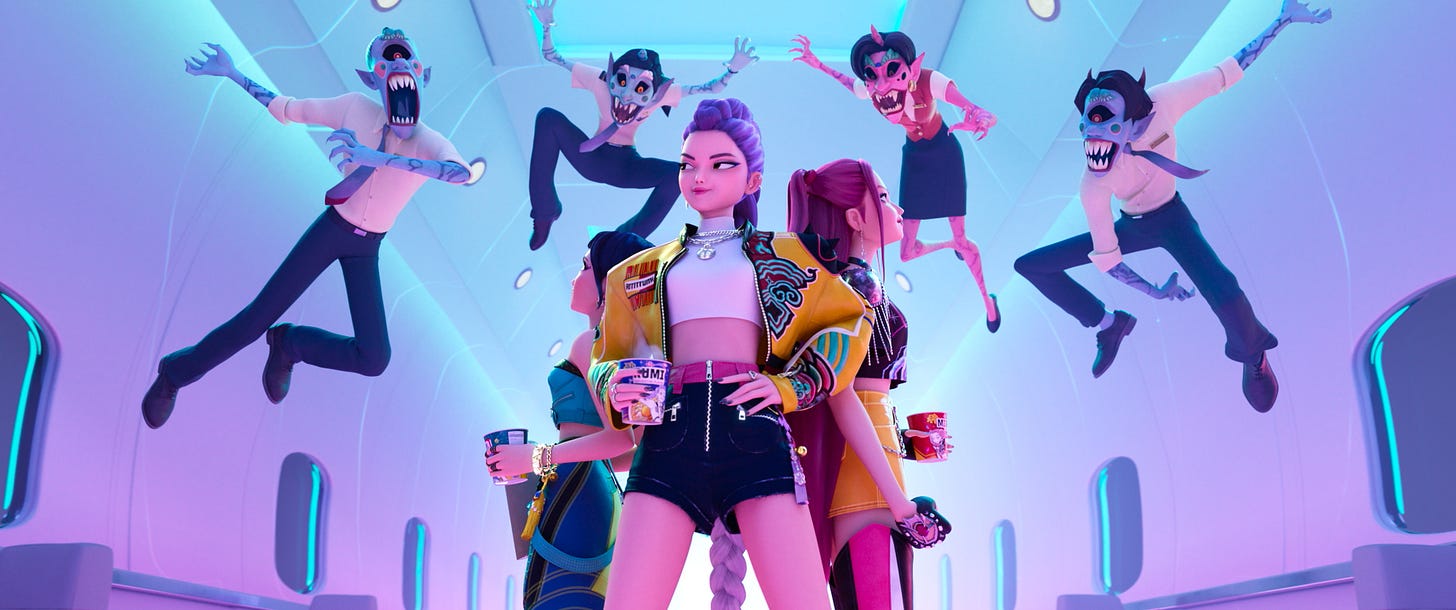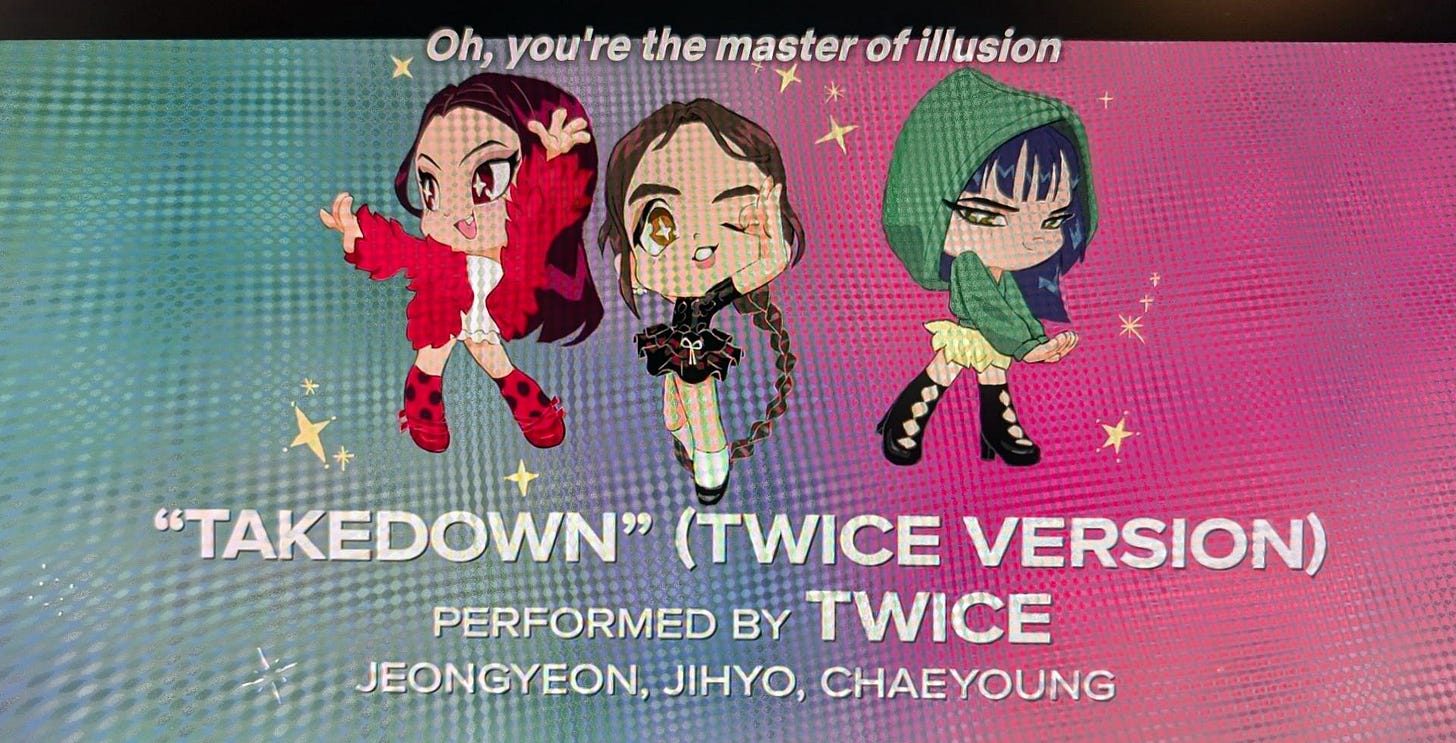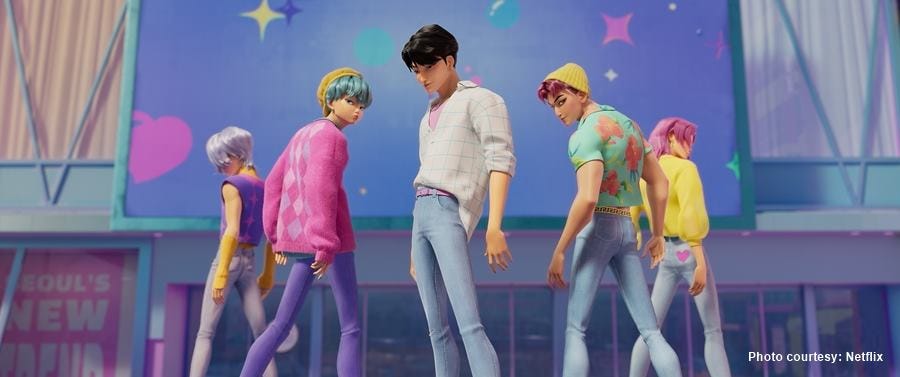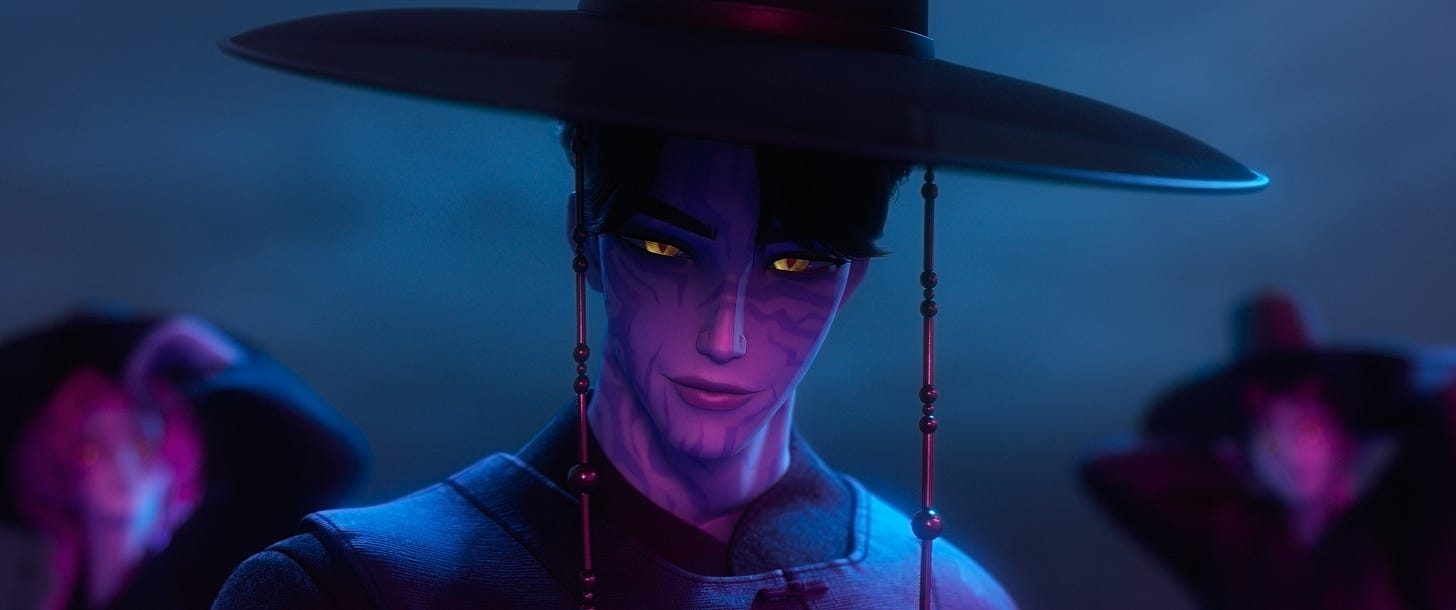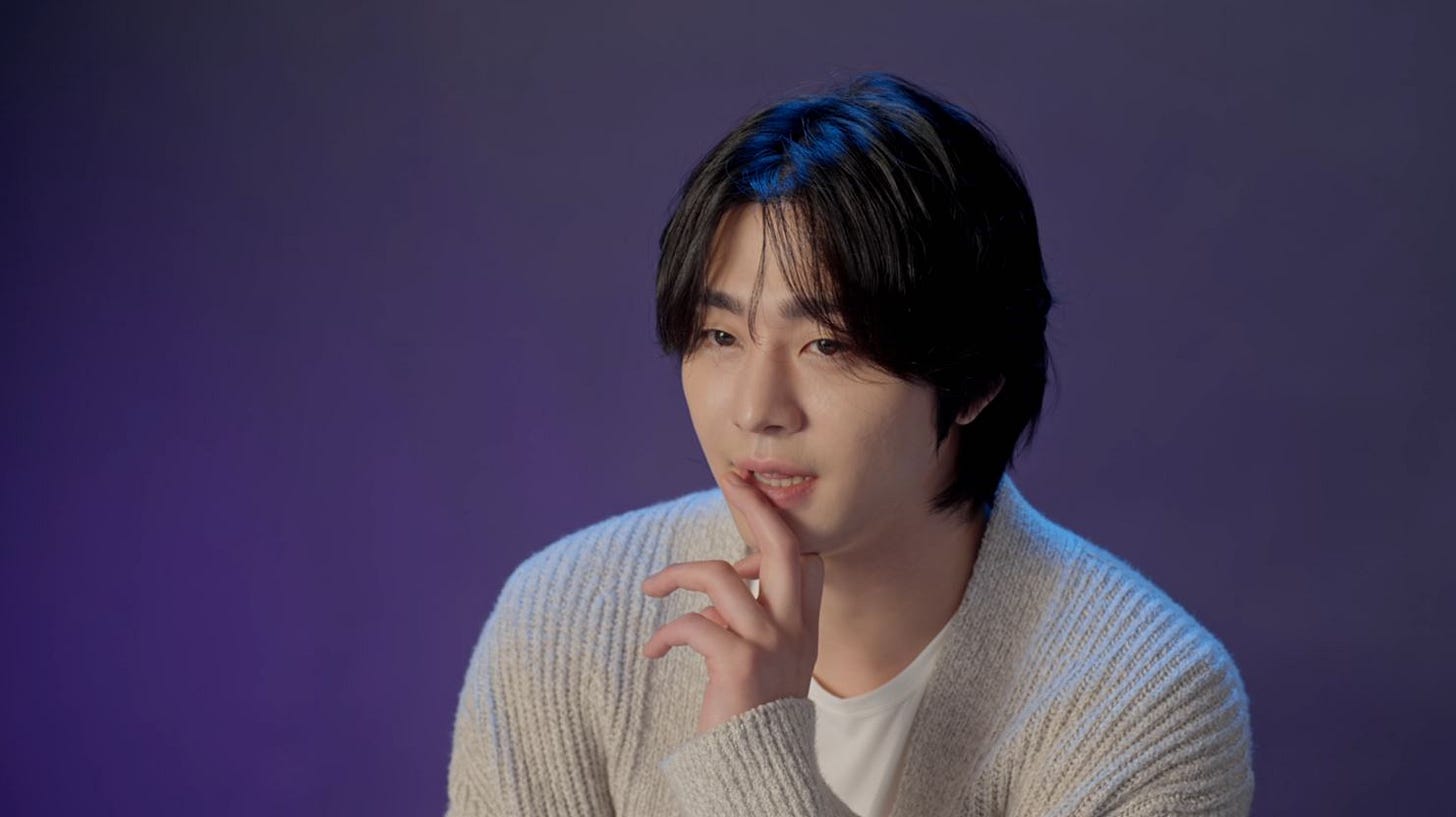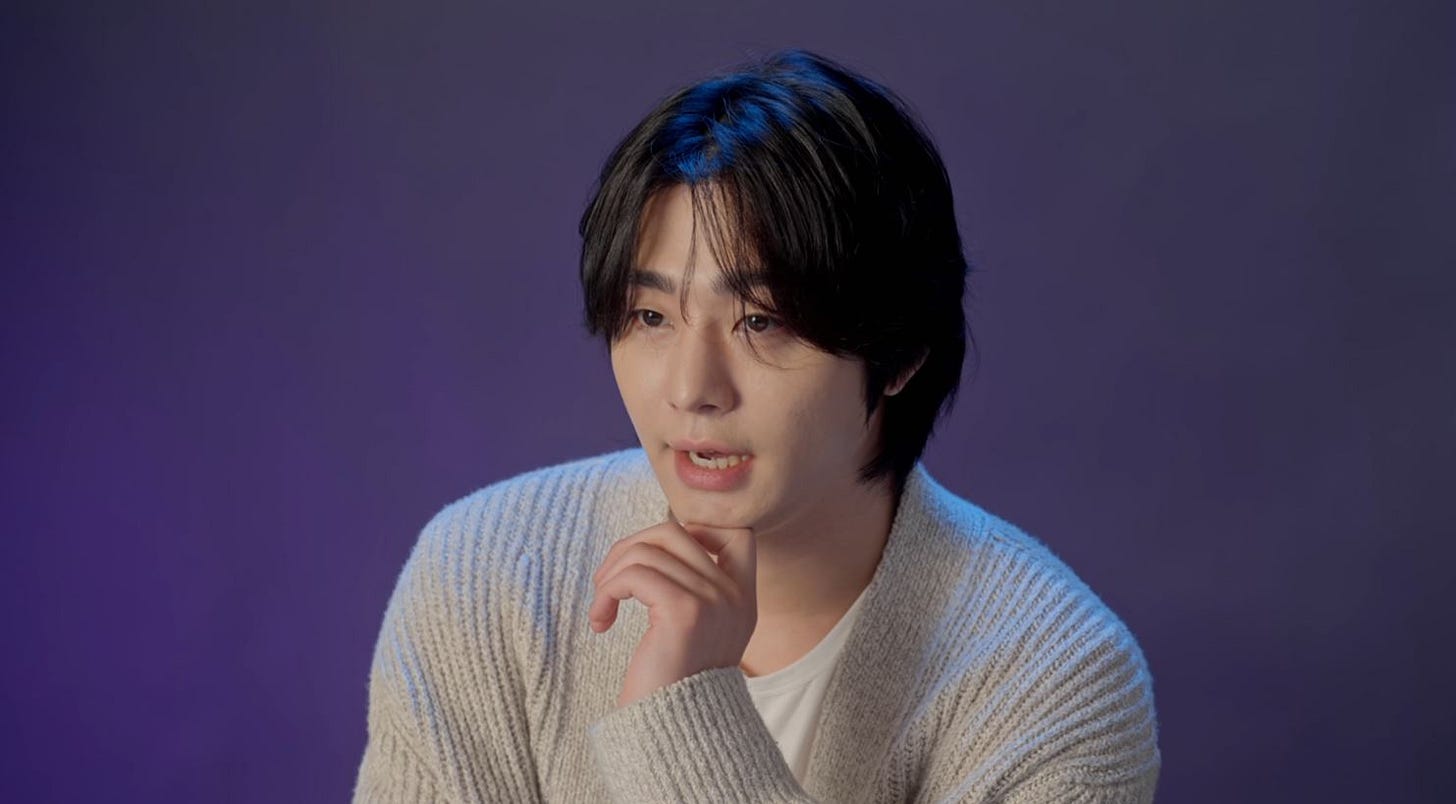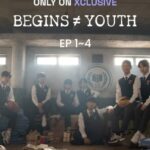How “KPop Demon Hunters” Incorporates Korean Mythology Into Its Film
Based on the Koreans and Korean diaspora I have interviewed over the decades, as well as my own lived experience as an immigrant, I would say that most of us never dreamed of the day when Korean pop culture would be considered cool to anyone other than — well — us.
But here we are in 2025, where Korean entertainment is everywhere.
✔ BTS is the biggest pop group in the world.
✔ Bong Joon-ho’s 2019 film Parasite won four Academy Awards.
✔ The first season of “Squid Game” remains Netflix’s most-watched show of all time with 265.2 million views.
✔ And a report by Ampere Analysis showed that K-dramas and Korean films represent 17% of Netflix’s top 500 non-U.S. shows, besting content from the United Kingdom and Japan.
☆☆☆ (out of ☆☆☆☆)
Rumi (voiced by Arden Cho)
Jinu (voiced by Ahn Hyo-seop)
To be clear, the animated KPop Demon Hunters is an American film. But it’s what I refer to as Korean adjacent, incorporating Korean traditions and pop culture references into a super fun, but also surprisingly touching movie about a girl group trying to save the world from demons, who are everywhere — even on a chartered flight disguised as flight attendants.
The voiceover at the beginning of the film tells viewers all that we’ll need to know: “The world will know you as pop stars, but you will be much more than that. You will be Hunters,” who slay soul-stealing demons. As for the demons? Their primary concern is to feed the souls to their nefarious King Gwi-ma.
Since the beginning of time, Hunters were always a trio of young women whose “music ignites the soul and brings people together.” It was the first Hunters who created the Honmoon, a shield that protects the world from demons.
If you’re thinking that this rings of “Buffy the Vampire Slayer” (the series, not the abysmal film), I would agree with you. But KPop Demon Hunters is so much more. It takes the existing premise of a girl saving the world, mixes it up with Korean culture, and adds a soundtrack that is really, really good.
Huntrix — comprised of leader Rumi, visual Mira and cutie pie rapper Zoey — are good and I can totally buy that they are the BlackpinkTwiceAespaBabyMonsterItzyIve of their girls’ generation.
I am someone who usually scoffs at how cringey fictional pop/rock bands are on TV and in films. The fake group’s songs almost always ring hollow for me. But here, most of the music is pitch perfect, thanks to artists like former SM trainee EJae and Kevin Woo, who used to be in the K-pop boy band U-KISS.
The filmmakers even recruited Jihyo, Jeongyeon, and Chaeyoung from the K-pop supergroup TWICE to sing “Takedown” (TWICE version) over the closing credits. (Notably, the real-life pop stars are the only ones to be shown on screen in non-animated form.)
Things are going swimmingly for Huntrix, until they meet a hot boy band called the Saja Boys, who are styled within an inch of their lives.
In Korean, saja/사자 is the word for lion. And one could infer that the group name was selected to represent a pride of strong, talented young men. But it’s not too long before the girls discover that the boys are, gasp, demons whose true selves look like more sinister.
K-drama fans will recognize what it means when a being is dressed like this: he’s a 저승사자/jeoseung-saja, or a grim reaper. (저승 refers to the other world.)
With inclusions like this, the creatives behind this film demonstrated that they not only knew what they were doing in telling a compelling story, but that they wanted this American film to resonate with Korean viewers as well — because most non-Koreans won’t understand the tie between Saja Boys and jeoseung-saja.
Within days of their debut, the Saja Boys have become Huntrix’s biggest competition, both as K-pop stars and in their fight to destroy and protect the Honmoon, respectively. After all, what easier prey is there than stealing the souls of K-pop fans? At least that’s what the Saja Boys are counting on.
But in a nod to the para-social relationships that K-pop idols have with their fandom, Huntrix makes it clear their fans are not going anywhere.
“You think we’re just going to let you steal our fans?” Rumi challenges. “You’re going to have to fight us for them.”
(Maybe this is what bickering fandoms should do, too, instead of hiding behind anonymous accounts to be harass each other on social media.)
“You’re just my type,” Zoey says as she confronts a handsome Saja Boy. “Oh well.” And then she annihilates him, because cute idols are temporary, but girl power and friendship is forever.
Near the end of the film, Huntrix sings, “Why did we cover up the colors stuck inside our head / Get up and let the jagged edges meet the light instead / Show me what’s underneath / I’ll find your harmony / fearless and undefined / This is what it sounds like.”
For Huntrix, the Saja Boys were always a wild and dangerous distraction. Their happiness lies within themselves, the friendship they share, and the art that they create together. But the secret that one of them withholds is what could destroy them.
While KPop Demon Hunters could’ve been a cutesy story about a boy-crazy girl group flirting with a boy band, there is a strong subtext here with a profound message. The secrets that we keep and the lies that we tell may have started off innocently enough. But they ultimately lead to our downfall unless we deal with the truth.
Release date: The 95-minute film released on Netflix today (June 20, 2025).
© 2025 JAE-HA KIM | All Rights Reserved
I have an interview with one of the stars of Kpop Demon Hunters that will be published early next week. While I can’t reveal who that is yet, I will say that it’s not with Ahn Hyo-seop, who voices Jino — the leader of the Saja Boys. He, like the other Korean actors, weren’t in Los Angeles earlier this week to talk to the media.
If he had been, I for sure would’ve asked him about his K-pop trainee days at JYP Entertainment, because the man can dance, play the piano and has a very nice singing voice. Had he pursued K-pop, he undoubtedly would’ve been designated as the visual of that boy band.
But things worked out fine for him. His acting career is flourishing, with leading roles in K-dramas like “Abyss,” “Business Proposal,” and “A Time Called You” (one of my faves).
Netflix provided reporters with a short video of Ahn answering questions about his experience working on KPop Demon Hunters. I transcribed his replies as accurately as I could. However, I tweaked the questions to make them more interesting.
What drew you to this film?
I’ve been a big animation fan since I was a kid, so it kind of intrigued me to be a part of the process. Also, I kind of wanted to give my fans overseas a memorable and joyful experience.
What themes are represented in “Kpop Demon Hunters?
This movie has so many different charms. One of my favorite Korean words is 아름다운/areumdaum, and it means beautiful. It carries the meaning of being true to oneself. So this story has embraced the idea that everyone has their own unique beauty, and that it can be accepting of differences. That can be very empowering.
How would you describe Jinu and his motives?
So a long time ago, Jinu made a very dangerous but life changing decision to make a deal with Gwi-ma (Lee Byung-hun) in order to protect his family. And that choice led to suffering and being trapped in darkness with his soul under someone else’s control. But despite all of that, I think Jinu still carries warmth and has a deep sense of love and curiosity about humanity.
And what about the demon boy band, the Saja Boys?
They are a boy group made up of five demons, led by Jinu. Each member has a unique personality. They may look like a regular idols when reality, they’re demons.
How does K-pop propel this film?
This project blends story, performance and music in a way that captivates audiences with this powerful energy and a very sophisticated sound. I think the film really captures the energy, passion and the connection K Pop has with its fans. The performances are portrayed very beautifully.
What was your reaction to the film?
I was very excited and nervous at the same time. It’s really hard to put into words, but I remember feeling completely overwhelmed in the best way possible. I think a lot of people would enjoy this film with their family or with their friends. But when I finally saw the finished film, it went far beyond anything what I pictured in my mind. So it was really beautiful and also very moving and also very funny, and it felt really surreal.
What role does music play in this movie?
What stood out to me most was how deeply music and emotion are woven into the art of animation. In many animated films, music plays more of a background role, but in this film, the music , the story and the emotions are all very well intertwined.
How do you think KPop Demon Hunters will impact audiences?
I hope that this film reminds people that we all have darkness within us, and sometimes the bravest thing we can do is to just face it. And at its core, this is a story about finding the strength to trust your own voice and move forward. So I hope it offers comfort and courage to those who actually really need it.
What is your impression of co-directors Maggie Kang and Chris Appelhans?
It was truly an honor to work with directors Maggie Kang and Chris Appelhans. Both directors guided me with such warmth and care, which helped me adjust really quickly. And they supported me in gaining a deeper understanding of the character and created an open space where I could actually express myself freely as an actor. I’m very grateful.
What makes animation such a special medium for storytelling?
I think animation is a medium that transcends the limits of imagination. It brings to life anything we can dream of, unrestricted by reality, and often rich in emotion, meaning and depth. So whether you’re a child or an adult, animation has the power to move parts and tell stories that stay with you, and that’s what makes it so powerful.
Since we’re talking about demons in this newsletter, I wanted to share a video of ENHYPEN singing the Imagine Dragons’ “Demons.” I almost always like the original song better than any covers. But this rendition of “Demons” is chef’s kiss and is my absolute favorite.
K-DRAMA INDEX
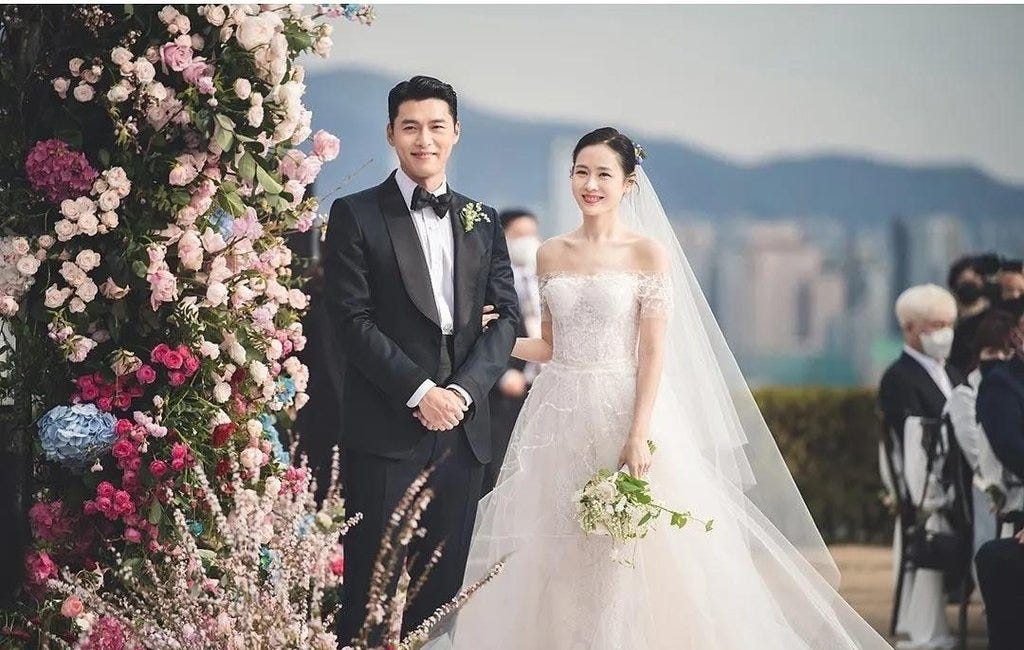
These are some of my reviews and essays about K-Dramas (and also Korean films and other Korean-centric projects). You may also read more about my take on Korean pop culture in outlets such as Rolling Stone, Mashable, Victoria & Al…

